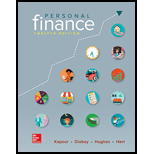
Concept explainers
Case summary:
J and R are arrived home from third weekend straight with their triplet touring colleges for their triplets. They are considering state university or community college. Triplets are leaning towards state university which will help in tuition fees but that are two hour car drive away. Due to the distance between home and college they are considering to buy a condominium near the college. They are trying to figure out whether this decision will be good or not. Eventually they decided to meet with financial planner JH and real estate broker AH as they are unfamiliar with the real estate investment opportunities.
Character in this case: J and R.
Adequate information:
Checking account: $5,000
Savings account: $47,000
Emergency fund savings account:
$40,000
House: $475,000
IRA balance: $85,000
Life insurance cash value: $125,000
Investments (stocks, bonds): $700,000
Car: $14,500 (J) and $18,000 (R)
J: $45,000 gross income ($31,500 net income after taxes)
R: $135,000 gross income ($97,200 net income after taxes)
Mortgage: $1,225
Property taxes: $500
Homeowner’s insurance: $300
IRA contribution: $300
Utilities: $250
Mortgage balance: $47,000
Credit card balance: $0
Car loans: $0
Food: $600
Gas/maintenance: $275
Entertainment: $300
Life insurance: $375
To determine: Liabilities that J and R can expect related to the purchase of the house.
Want to see the full answer?
Check out a sample textbook solution
Chapter 17 Solutions
Loose Leaf for Personal Finance
- Need the below table filled out for Short-term debt %, Long-term debt $,%, Common equity $,% and Total capital $,%. Market Value Capital Structure Suppose the Schoof Company has this book value balance sheet: Current assets $30,000,000 Current liabilities $20,000,000 Notes payable 10,000,000 Fixed assets 70,000,000 Long-term debt 30,000,000 Common stock (1 million shares) 1,000,000 Retained earnings 39,000,000 Total assets $100,000,000 Total liabilities and equity $100,000,000 The notes payable are to banks, and the interest rate on this debt is 11%, the same as the rate on new bank loans. These bank loans are not used for seasonal financing but instead are part of the company's permanent capital structure. The long-term debt consists of 30,000 bonds, each with a par value of $1,000, an annual coupon interest rate of 6%, and a 15-year maturity. The going rate of interest on new long-term debt, rd, is 12%, and this is the…arrow_forwardNed assistance with Q3 and Q4 below? Cost of Equity The earnings, dividends, and stock price of Shelby Inc. are expected to grow at 6% per year in the future. Shelby's common stock sells for $21 per share, its last dividend was $1.00, and the company will pay a dividend of $1.06 at the end of the current year. Using the discounted cash flow approach, what is its cost of equity? Round your answer to two decimal places. 11.06 % If the firm's beta is 1.3, the risk-free rate is 8%, and the expected return on the market is 11%, then what would be the firm's cost of equity based on the CAPM approach? Round your answer to two decimal places. 11.90% If the firm's bonds earn a return of 9%, then what would be your estimate of rs using the own-bond-yield-plus-judgmental-risk-premium approach? (Hint: Use the mid-point of the risk premium range.) Round your answer to two decimal places. % On the basis of the results of parts a–c, what would be your estimate of Shelby's cost of equity?…arrow_forwardWhat monthly compounded interest rate would Second National Bank need to pay on savings deposits to provide an effective rate of 6.2%?arrow_forward
- Hello tutor this is himlton biotech problem.arrow_forwardYan Yan Corp. has a $2,000 par value bond outstanding with a coupon rate of 4.7 percent paid semiannually and 13 years to maturity. The yield to maturity of the bond is 5.05 percent. What is the dollar price of the bond?arrow_forwardA trip goa quesarrow_forward
 Essentials Of InvestmentsFinanceISBN:9781260013924Author:Bodie, Zvi, Kane, Alex, MARCUS, Alan J.Publisher:Mcgraw-hill Education,
Essentials Of InvestmentsFinanceISBN:9781260013924Author:Bodie, Zvi, Kane, Alex, MARCUS, Alan J.Publisher:Mcgraw-hill Education,

 Foundations Of FinanceFinanceISBN:9780134897264Author:KEOWN, Arthur J., Martin, John D., PETTY, J. WilliamPublisher:Pearson,
Foundations Of FinanceFinanceISBN:9780134897264Author:KEOWN, Arthur J., Martin, John D., PETTY, J. WilliamPublisher:Pearson, Fundamentals of Financial Management (MindTap Cou...FinanceISBN:9781337395250Author:Eugene F. Brigham, Joel F. HoustonPublisher:Cengage Learning
Fundamentals of Financial Management (MindTap Cou...FinanceISBN:9781337395250Author:Eugene F. Brigham, Joel F. HoustonPublisher:Cengage Learning Corporate Finance (The Mcgraw-hill/Irwin Series i...FinanceISBN:9780077861759Author:Stephen A. Ross Franco Modigliani Professor of Financial Economics Professor, Randolph W Westerfield Robert R. Dockson Deans Chair in Bus. Admin., Jeffrey Jaffe, Bradford D Jordan ProfessorPublisher:McGraw-Hill Education
Corporate Finance (The Mcgraw-hill/Irwin Series i...FinanceISBN:9780077861759Author:Stephen A. Ross Franco Modigliani Professor of Financial Economics Professor, Randolph W Westerfield Robert R. Dockson Deans Chair in Bus. Admin., Jeffrey Jaffe, Bradford D Jordan ProfessorPublisher:McGraw-Hill Education





